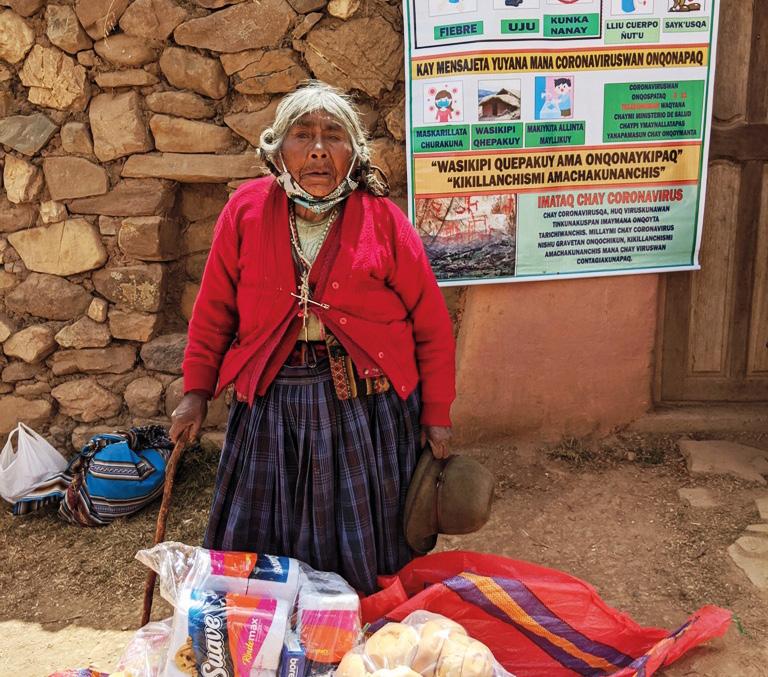
3 minute read
PLENTY THEN AND PLENTY NOW...
Plenty Canada, a rural community-based nongovernmental organization, was formed in 1976 in response to an earthquake that devastated Mayan communities in Guatemala. Utilizing sustainable technologies, combined with local Indigenous knowledge, its volunteers helped reconstruct over 1,400 homes and a dozen schools and clinics while communicating Indigenous concerns and protocols to international agencies.
The organization gained distinction for its innovation in the international development field for blending science with the humanities to design programs that met the distinct needs of its partners. It was among the first to use solar voltaic panels to power its remote facilities in the mountains of Lesotho, Africa, in 1981.

Plenty Canada solar panel array produces sustainable energy from the roof of its Lanark office.
Plenty advanced nutritional health for thousands of Sri Lankans in South Asia through its integration of soya protein into the traditional diets of the people in 1985. And among its seminal Indigenous work, it led the way in 1991 by providing reconstruction and rehabilitation support to Miskito, Sumu, and Rama communities destroyed during the Contra War. This tragic history remains all but ignored by the world. In the early 1990s, led by Executive Director Larry McDermott (Algonquin), Plenty Canada began a shift toward working predominantly with Indigenous peoples. It was difficult and challenging, but proactive and ultimately a rewarding decision. The organization faced a backlash, both internally and externally. But as it enters its 45th year, it does so with great pride for having acted upon its own vision and agency, guided by a call to consciousness and resolute quest for justice for Indigenous peoples.
Over time, the voices of resistance became muted by a number of high profile events, including Canada’s Truth and Reconciliation Commission findings, the compounding national tragedy of missing and murdered Indigenous women and girls, the publicized lack of potable water in First Nations communities, and growing data on persistent health and income disparities, all of which have vindicated the organization’s work with Indigenous peoples internationally, and at home.
Guided by values centred on sustainability, Plenty Canada remains actively involved abroad assisting Mayan and Quechua communities, in Guatemala and Peru, respectively, in their pursuit of food security/sovereignty and COVID-19 preparedness and prevention:

Community elder Mayan women in Guatemala receive Plenty Canada care packages to meet urgent needs caused by the COVID-19 pandemic.
• In Guatemala, the emphasis is on assisting women elders and their families. The project supports food production and provides resources to increase the planting and harvesting of appropriate cultural foods that are staples of the Mayan diet. However, in the near term, emergency assistance is being provided during the pandemic to supply survival packages that include food, basic hygienic supplies, and instructional materials in support of hundreds of families.

Community elder Mayan women in Guatemala receive Plenty Canada care packages to meet urgent needs caused by the COVID-19 pandemic.
• For the people of the Chawaytiri and Pampallaqta communities in Peru, the pandemic has worsened an already difficult situation. There is little relief, neither with food nor with supplies to assist with hygiene, nor with adequate information on preventing the COVID-19 pandemic or how to care for affected persons. Plenty Canada is organizing to supply survival packages to these communities as well.

Copy of the Fall 1992 Contact Plenty Canada newsletter which signalled its 1993 shift in focus toward Indigenous peoples.
Since 1993, Plenty Canada has also become more active in initiating innovative Indigenous projects within Canada:

Plenty Canada’s The Great Niagara Escarpment Indigenous Cultural Map showing the location pin for the Landscape of Nations Memorial located in Queenston Heights Park.
• More recently in Ontario, for example, the organization is developing Gchi-Bimadinaa, The Great Niagara Escarpment Indigenous Cultural Map, an online multimedia resource containing stunning photography, captivating video, and information that identifies important Indigenous historic, cultural, and natural world locations along more than 750 kilometres from Niagara Falls to the western region of Manitoulin Island. The benefits of this remarkable educational platform extend to Indigenous communities, municipalities, and schools throughout the province.

• Other Plenty Canada projects across Canada include working to protect species at risk (such as the American eel), ecosystem protection from invasive alien species, traditional medicine protection, sustainable forestry, heritage seed preservation and propagation (such as with Manoomin, wild rice), erosion control, and application of renewable technologies.
Based upon a philosophical foundation that includes the Seven Grandfather Teachings of Love, Humility, Courage, Generosity, Respect, Truth, and Wisdom, and with decisions made in the best interest of the Seventh Generation, Plenty Canada continues its focus on environmental stewardship and sustainable activities involving Indigenous peoples.
Long before the international community ratified the United Nations Declaration on the Rights of Indigenous Peoples in 2007 (with Canada’s late adoption coming in 2016), Plenty Canada has been active, remaining focused on Indigenous issues that were seemingly invisible yesterday, but today are obvious.
Please assist Plenty Canada by supporting its vital work. To learn more and to donate, visit plentycanada.com.










